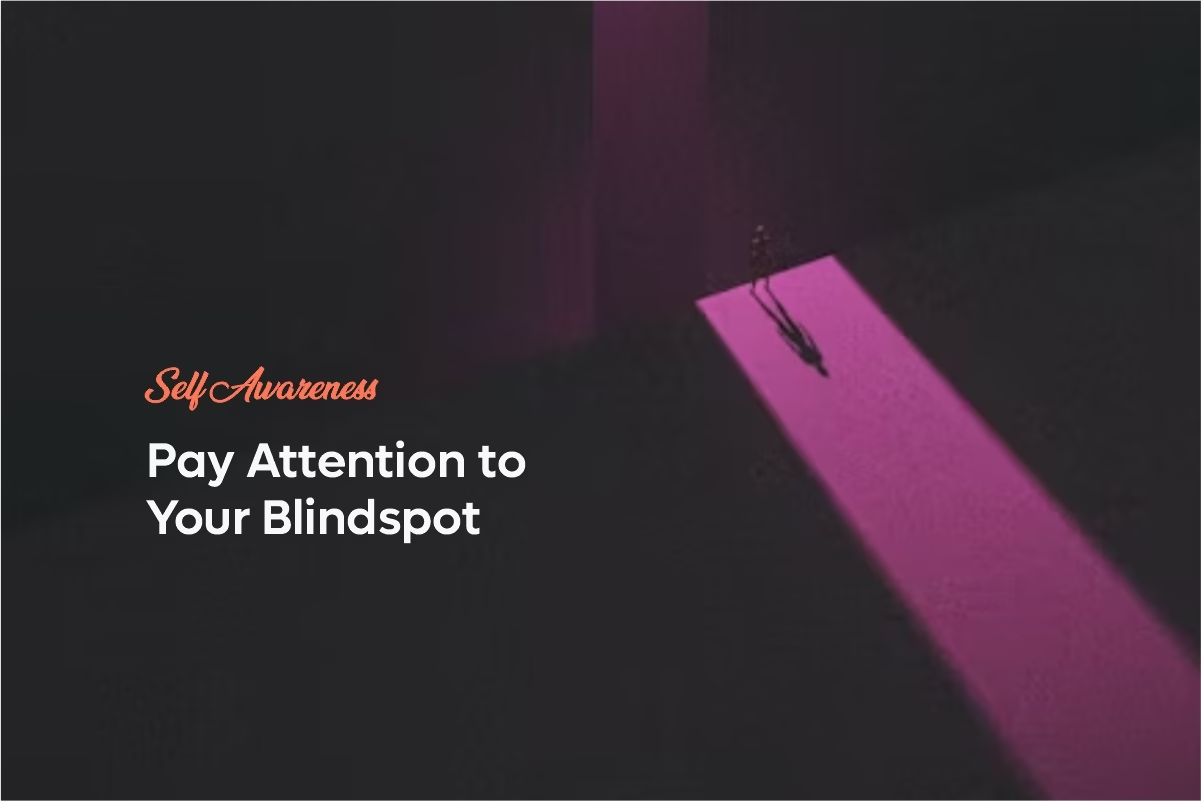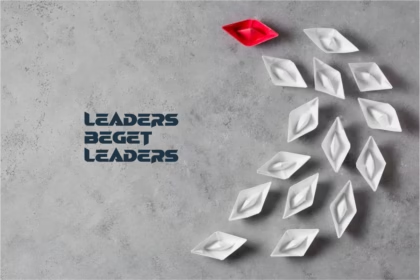There’s a sobering truth most leaders refuse to admit: the greatest threat to your future isn’t what you see coming. It’s what you don’t. What you overlook. What everyone else notices but you remain oblivious to.
These invisible flaws are called blind spots, and they have the power to derail relationships, leadership, and destiny before you even realize what happened. The most dangerous part? By definition, you can’t see them.
They’re silent saboteurs operating in the background of your life, shaping outcomes you didn’t intend and triggering consequences you didn’t anticipate.
To be self-aware is to know about your strengths, to uncover the weaknesses you’ve been trained to ignore.
What Are Blind Spots?
In the simplest terms, blind spots are habits, attitudes, or weaknesses you don’t see but others do.
They’re the unintentional patterns that show up in how you lead, love, communicate, and make decisions. While you might think you’re being assertive, others experience you as aggressive. You believe you’re being cautious, but your team feels stifled by your control.
Rarely will you see anyone who is exempt from this reality. We all carry blind spots because we all have limited perspective. Our past experiences, insecurities, and defense mechanisms create blind angles we simply cannot see without help.
The question isn’t whether you have them. The question is whether you’re willing to discover them before they cost you something irreplaceable.
Why Blind Spots Are Dangerous
Blind spots don’t announce themselves. They work quietly, distorting your self-awareness until the gap between who you think you are and who you actually are becomes a chasm. You start making decisions based on a false version of yourself, one that exists only in your mind.
They silently sabotage relationships and leadership. You wonder why your team seems disengaged, why your spouse withdraws, why friendships feel strained. Meanwhile, the real issue is something you’re doing repeatedly without realizing it. Your blind spots create relational friction that you attribute to everyone else’s sensitivity rather than your impact.
Perhaps most devastating, blind spots cause repeated cycles of failure. You keep hitting the same wall in different seasons. Different cities, different jobs, different relationships, but the same outcome. That’s not coincidence or bad luck. That’s a pattern you haven’t identified because you can’t see the common denominator: you.
Left unchecked, blind spots don’t just slow progress. They can derail purpose entirely. The calling on your life requires a level of self-awareness and character that blind spots actively prevent. You cannot walk into your destiny carrying unaddressed flaws that undermine everything you build.
Common Types of Blind Spots
Let’s get practical. What do blind spots actually look like in everyday life?
- Pride disguised as confidence. You believe you’re self-assured, but others experience you as dismissive. You don’t ask questions because you assume you already know. You interrupt conversations because you’re convinced your perspective is the right one. What feels like strength to you reads as arrogance to everyone else.
- Insecurity disguised as humility. You think you’re being humble by deflecting compliments and minimizing achievements, but what people actually hear is self-pity. Your constant self-deprecation makes others uncomfortable and exhausting. True humility doesn’t require you to diminish yourself; it simply acknowledges God’s grace without false modesty.
- Control disguised as excellence. You call it having high standards. Others call it micromanaging. You believe you’re ensuring quality, but you’re actually suffocating initiative and creativity in those around you. Your need for control reveals a deeper issue: you don’t trust others, and maybe you don’t even trust God with outcomes.
- Overcommitment disguised as passion. You say yes to everything because you’re driven and enthusiastic. But your family feels neglected. Your health is declining. Your quality of work is slipping. What you label as passion is actually poor boundaries and an inability to prioritize what truly matters.
- Aggression disguised as boldness. You pride yourself on being direct and unfiltered. You think you’re just being real. But your words leave wounds. Your “boldness” is actually unprocessed anger, and people are learning they’re not safe around you.
- Silence disguised as wisdom. You withhold feedback, avoid confrontation, and stay quiet when you should speak up. You tell yourself you’re being wise and diplomatic, but your silence enables dysfunction. Sometimes love requires you to say the hard thing, and your refusal to speak isn’t wisdom; it’s fear.
Root Causes of Blind Spots
Understanding where blind spots come from helps you dismantle them. Often, they develop because you lack honest feedback. You’re surrounded by people who affirm but never correct. Your circle has become an echo chamber that reflects back only what you want to hear, not what you need to know.
Some environments only affirm and never correct. Social media rewards performance over authenticity. Organizational cultures prioritize loyalty over truth-telling. When everyone around you is nodding in agreement, your blind spots grow larger and more entrenched.
Past trauma often builds defense mechanisms that become blind spots. If you were criticized harshly growing up, you might now reject all feedback as attack. If you were abandoned, you might cling to control as a survival mechanism. These protective patterns served you once, but now they’re limiting you.
Then there’s self-deception and willful ignorance. Deep down, you sense something is off. You’ve heard the same critique from multiple sources. But acknowledging it would require change, discomfort, and humility. So you rationalize. You justify. You ignore what your spirit knows is true.
How to Spot Blind Spots Before They Sabotage You
So how do you see what you can’t see? It starts with intentionality and a commitment to self-awareness that goes beyond surface-level reflection.
- Invite brutal honesty from mentors and friends. Not polite feedback. Brutal honesty. Ask people who love you enough to risk the relationship by telling you the truth. Create permission for them to speak into areas you’ve made off-limits. If no one ever challenges you, you’re not surrounded by the right people.
- Pay attention to repeated patterns of failure. When the same problem shows up in different contexts, stop blaming circumstances. Start asking what role you’re playing in creating that pattern. The common denominator in all your failed relationships, toxic work environments, or broken partnerships is you.
- Listen to the feedback you resist. The critique that makes you immediately defensive is usually the one that’s hitting closest to truth. Your emotional reaction is a signal. Instead of explaining it away, sit with it. Ask yourself why it triggered such a strong response.
- Notice what triggers overreactions. If a small comment sends you into emotional overdrive, there’s a blind spot there. Your reaction is disproportionate to the situation, which means something deeper is at play. What insecurity, fear, or unhealed wound is driving that response?
- Evaluate unintended consequences of your actions. You meant well, but the outcome was harmful. Don’t just apologize and move on. Dig deeper. What blind spot caused the disconnect between your intention and your impact?
- Pray for revelation from the Holy Spirit. God sees everything. Ask Him to reveal what you cannot see on your own. Invite the Holy Spirit to search your heart and expose hidden areas of pride, fear, control, or insecurity. Then have the courage to accept what He shows you.
Daily Practices to Stay Aware
Self-awareness isn’t a one-time event. It’s a daily discipline that requires intentional practices to maintain.
Journaling and self-reflection create space to process your day through a lens of honesty. Ask yourself questions like:
- Where did I act out of fear today?
- When did I speak when I should have listened?
- What feedback did I dismiss too quickly?
Get in the habit of asking, “What did I miss today?” This single question trains your mind to look for blind spots instead of assuming you saw everything clearly. It cultivates humility and curiosity rather than defensiveness.
Build feedback systems into your life. This might look like an inner circle that meets regularly to speak truth into your life. It could be anonymous surveys for your team. It might be a spouse who has explicit permission to call out patterns they see. Don’t wait for feedback to come to you. Create structures that ensure it does.
Practice vulnerability. Let people see your struggle, your doubt, your growth areas. When you pretend to have it all together, you cut yourself off from the very feedback that could transform you. Vulnerability isn’t weakness; it’s the soil where self-awareness grows.
Most importantly, submit to God’s Word for correction. Scripture has a way of exposing what we’d rather keep hidden. Read it not just for inspiration but for conviction. Let it confront your attitudes, motives, and behaviours. The Word of God is living and active, able to discern the thoughts and intentions of the heart.
Blind Spots in Leadership and Relationships
The stakes for addressing blind spots increase with influence.
In leadership, when you rise, fewer people are willing to correct you. Power creates distance. People become more concerned with protecting their position than protecting you from yourself. The higher you go, the more intentional you must be about creating channels for honest feedback.
In relationships, you may think you’re loving well while still causing hurt. Your spouse feels unheard, but you’re convinced you’re an attentive listener. Your kids feel pressured, but you believe you’re just encouraging them. The gap between your self-perception and their experience is a blind spot that’s slowly eroding connection.
Blind spots impact trust, connection, and influence in ways that compound over time. One unaddressed pattern can create a reputation that follows you. Teams learn not to bring you bad news. Friends stop being honest because it’s not worth the conflict. Eventually, you’re leading in isolation, wondering why no one feels close to you anymore.
The Biblical Angle
Scripture is filled with examples of blind spots being exposed through relationships and divine intervention.
When King David committed adultery with Bathsheba and orchestrated her husband’s murder, he was blind to his own sin until the prophet Nathan confronted him with a story that revealed David’s blind spot. David needed someone outside himself to hold up a mirror.
When Moses was burning out trying to judge every dispute among the Israelites, he couldn’t see the unsustainable pattern he’d created. It took his father-in-law, Jethro, to observe from the outside and offer a better way. Sometimes blind spots aren’t moral failures; they’re structural flaws in how we operate.
Jesus spent three years discipling Peter out of his blind spots. Peter thought he was bold and loyal, but Jesus knew he was impulsive and prone to denial. Jesus didn’t shame Peter; He lovingly confronted, corrected, and commissioned him into the leader he was meant to become.
The principle is clear: God uses people to reveal what you can’t see yourself. He rarely sends a lightning bolt to expose your blind spots. He sends a Nathan, a Jethro, a loving Savior who walks with you through the process of transformation. Will you listen when they speak?
Blind spots aren’t signs of failure.
Yes, they are not. They are signs you’re human. Every person navigating leadership, relationships, and purpose carries areas they can’t fully see. The real danger isn’t having blind spots. The real danger is refusing to acknowledge them.
When you resist feedback, justify patterns, and surround yourself only with people who affirm you, blind spots calcify into character flaws that sabotage everything you build. But when you commit to self-awareness, invite honest voices, and submit yourself to the process of growth, those same blind spots become opportunities for transformation.
Spot them early. Deal with them honestly. Grow into greater influence. Your future depends not on perfecting your strengths but on confronting what you can’t yet see.






